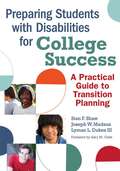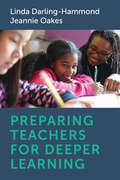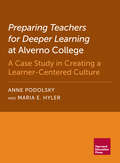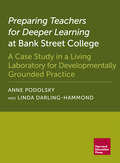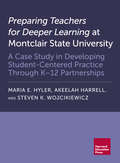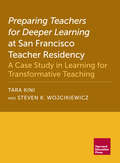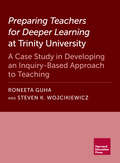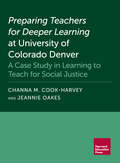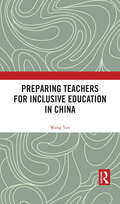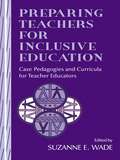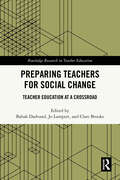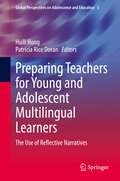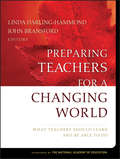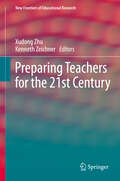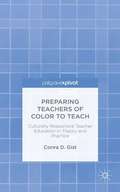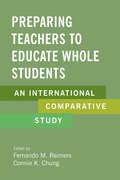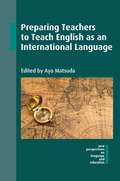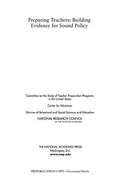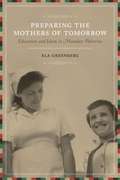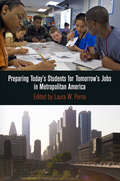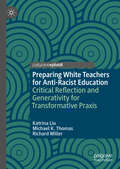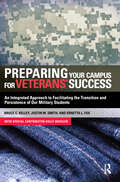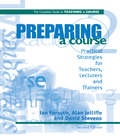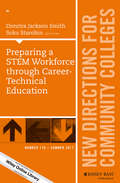- Table View
- List View
Preparing Students with Disabilities for College Success: A Practical Guide to Transition Planning
by Joseph W. Madaus Stan F. Shaw Lyman L DukesFor students with mild to moderate, non-visible disabilities, navigating a college education without the support team they had in high school can be challenging. Help students become effective self-advocates and maximize their postsecondary possibilities with this cutting-edge book, which balances current research with the most practical guidance to date on this topic.
Preparing Teachers for Deeper Learning
by Jeannie Oakes Linda Darling-HammondPreparing Teachers for Deeper Learning answers an urgent call for teachers who educate children from diverse backgrounds to meet the demands of a changing world. In today&’s knowledge economy, teachers must prioritize problem-solving ability, adaptability, critical thinking, and the development of interpersonal and collaborative skills over rote memorization and the passive transmission of knowledge. Authors Linda Darling-Hammond and Jeannie Oakes and their colleagues examine what this means for teacher preparation and showcase the work of programs that are educating for deeper learning, equity, and social justice. Guided by the growing knowledge base in the science of learning and development, the book examines teacher preparation programs at Alverno College, Bank Street College of Education, High Tech High&’s Intern Program, Montclair State University, San Francisco Teacher Residency, Trinity University, and University of Colorado Denver. These seven programs share a common understanding of how people learn that shape similar innovative practices. With vivid examples of teaching for deeper learning in coursework and classrooms; interviews with faculty, school partners, and novice teachers; surveys of teacher candidates and graduates; and analyses of curriculum and practices, Preparing Teachers for Deeper Learning depicts transformative forms of teaching and teacher preparation that honor and expand all students&’ abilities, knowledges, and experiences, and reaffirm the promise of educating for a better world.
Preparing Teachers for Deeper Learning at Alverno College: A Case Study in Creating a Learner-Centered Culture
by Maria E. Hyler Anne PodolskyThe Alverno College case is one of seven that form the basis for the arguments and analyses presented in Preparing Teachers for Deeper Learning. Each case outlines the context, vision, and practices guiding a particular program&’s enactment, and includes sample curricula, assessment and feedback forms, and the program details that have contributed to its success. The cases are valuable reading for educators involved in developing teacher candidates who are self-directed, collaborative, social justice–focused, and prepared to meet the needs of today&’s students and a changing society.
Preparing Teachers for Deeper Learning at Bank Street College: A Case Study in a Living Laboratory for Developmentally Grounded Practice
by Linda Darling-Hammond Anne PodolskyThe Bank Street College case is one of seven that form the basis for the arguments and analyses presented in Preparing Teachers for Deeper Learning. Each case outlines the context, vision, and practices guiding a particular program&’s enactment, and includes sample curricula, assessment and feedback forms, and the program details that have contributed to its success. The cases are valuable reading for educators involved in developing teacher candidates who are self-directed, collaborative, social justice–focused, and prepared to meet the needs of today&’s students and a changing society.
Preparing Teachers for Deeper Learning at High Tech High: A Case Study in Building a Project-Based Learning Environment
by Steven K. Wojcikiewicz Akeelah Harrell Charmaine N. Jackson MercerThe High Tech High case is one of seven that form the basis for the arguments and analyses presented in Preparing Teachers for Deeper Learning. Each case outlines the context, vision, and practices guiding a particular program&’s enactment, and includes sample curricula, assessment and feedback forms, and the program details that have contributed to its success. The cases are valuable reading for educators involved in developing teacher candidates who are self-directed, collaborative, social justice–focused, and prepared to meet the needs of today&’s students and a changing society.
Preparing Teachers for Deeper Learning at Montclair State University: A Case Study in Developing Student-Centered Practice Through K-12 Partnerships
by Steven K. Wojcikiewicz Maria E. Hyler Akeelah HarrellThe Montclair State University case is one of seven that form the basis for the arguments and analyses presented in Preparing Teachers for Deeper Learning. Each case outlines the context, vision, and practices guiding a particular program&’s enactment, and includes sample curricula, assessment and feedback forms, and the program details that have contributed to its success. The cases are valuable reading for educators involved in developing teacher candidates who are self-directed, collaborative, social justice–focused, and prepared to meet the needs of today&’s students and a changing society.
Preparing Teachers for Deeper Learning at San Francisco Teacher Residency: A Case Study in Learning for Transformative Teaching
by Steven K. Wojcikiewicz Tara KiniThe San Francisco Teacher Residency case is one of seven that form the basis for the arguments and analyses presented in Preparing Teachers for Deeper Learning. Each case outlines the context, vision, and practices guiding a particular program&’s enactment, and includes sample curricula, assessment and feedback forms, and the program details that have contributed to its success. The cases are valuable reading for educators involved in developing teacher candidates who are self-directed, collaborative, social justice–focused, and prepared to meet the needs of today&’s students and a changing society.
Preparing Teachers for Deeper Learning at Trinity University: A Case Study in Developing an Inquiry-Based Approach to Teaching
by Roneeta Guha Steven K. WojcikiewiczThe Trinity University case is one of seven that form the basis for the arguments and analyses presented in Preparing Teachers for Deeper Learning. Each case outlines the context, vision, and practices guiding a particular program&’s enactment, and includes sample curricula, assessment and feedback forms, and the program details that have contributed to its success. The cases are valuable reading for educators involved in developing teacher candidates who are self-directed, collaborative, social justice–focused, and prepared to meet the needs of today&’s students and a changing society.
Preparing Teachers for Deeper Learning at University of Colorado Denver: A Case Study in Learning to Teach for Social Justice
by Jeannie Oakes Channa M. Cook-HarveyThe University of Colorado Denver case is one of seven that form the basis for the arguments and analyses presented in Preparing Teachers for Deeper Learning. Each case outlines the context, vision, and practices guiding a particular program&’s enactment, and includes sample curricula, assessment and feedback forms, and the program details that have contributed to its success. The cases are valuable reading for educators involved in developing teacher candidates who are self-directed, collaborative, social justice–focused, and prepared to meet the needs of today&’s students and a changing society.
Preparing Teachers for Inclusive Education in China
by Wang YanFocusing on the competence of teachers that underpins inclusive education seeking equal access to education for special needs children, this title examines teacher competence cultivation based on examples in China and excellent international experience. To give a clear picture of the context of inclusive education in China, the author first clarifies the relevant concepts and reviews the evolving policies and practices embodied in the “Learning in Regular Classrooms (LRC)” program. The study then constructs an analytical model of four key indicators that help evaluate the competence of teachers in inclusive education. Based on analysis of the influencing factors of teacher competence, the book elucidates how these factors work to determine teacher competence. Drawing on international experience, especially pre-service teacher cultivation in the US and in-service training in China, it introduces three major cultivation models and feasible suggestions and strategies to improve the competence of teachers in inclusion. This book will benefit researchers, professionals, and policymakers interested in inclusive education, special education, and teacher education.
Preparing Teachers for Inclusive Education: Case Pedagogies and Curricula for Teacher Educators
by Suzanne E. WadeThis book--a companion volume to Inclusive Education: A Casebook and Readings for Prospective and Practicing Teachers--is designed to assist instructors in using Inclusive Education as a text for preservice or in-service teacher education courses. Part I (Chapters 1-5) of Preparing Teachers for Inclusive Education provides a general introduction to case pedagogies and chapters describing curricula that teacher educators have developed using cases designed to prepare teachers for inclusive education. Part II provides Teaching Notes that correspond to the 14 cases in Inclusive Education.
Preparing Teachers for Social Change: Teacher Education at a Crossroad (Routledge Research in Teacher Education)
by Jo Lampert Clare Brooks Babak DadvandThis book critically evaluates the dynamic landscape of teacher education on a global scale, delving into its recent advancements, innovations, and emerging paradigms. Recognizing the need to arm teachers with the capacity to address contemporary challenges, the authors emphasize inventive approaches within teacher education that can foster the ability to confront problems such as unprecedented inequality, resurgence of ultra-right movements, environmental crises, and the interconnected dilemmas of today's world.By analysing the intricacies, strengths, and limitations inherent in existing teacher education models, Dadvand, Lampert, and Brooks and their contributors examine current frameworks and consider the potential and drawbacks in preparing educators to effectively tackle multifaceted challenges. The chapters focus on the opportunities and limitations presented by ongoing trends in Initial Teacher Education, particularly in relation to the most urgent issues of our time.This valuable resource for educators, policymakers, and researchers is an essential read for anyone committed to fostering social justice and inclusive education and seeking to equip educators for the challenges of today's world.
Preparing Teachers for Young and Adolescent Multilingual Learners: The Use of Reflective Narratives (Global Perspectives on Adolescence and Education #3)
by Patricia Rice Doran Huili HongMultilingual learners (MLs) students spend most of their school time with their teachers, who often feel professionally unprepared to meet their linguistically diverse students' needs. As such, preparing teachers for increasing numbers of multilingual learners (MLs) has become a critical factor in promoting equity and success for all students in our global society. This book explores and highlights the reflective narratives of teacher educators, in-service, and preservice teachers. It shows how these narratives are grounded in their personal lives, professional training, and daily teaching, and how they can unfold the complexities in their various experiences and the rich implications for MLs teaching and teacher preparation. The book presents papers that utilize teachers' reflective narratives to prepare and train teachers who are or will be working with MLs. It discusses the challenges and implications of teaching groups of MLs made up of diverse learners, including immigrants, refugees, and learners with disabilities. 'This book seeks to change the narrative of some of our most vulnerable student populations by giving voice to the experiences, challenges, success, and best practices encountered in the international education landscape. The power contained within each chapter is the systematic and intentional reflections that bring the marginalized stories to the center of the discussion. Anyone seeking an understanding of how reflective narrative can build equity and social justice for multilingual learners will appreciate the breadth of experience described. This understanding is critical for culturally and linguistically diverse teaching and learning.' Jordan González, Ph.D., St. John's University, NY
Preparing Teachers for a Changing World: What Teachers Should Learn and Be Able to Do
by Linda Darling-Hammond John BransfordBased on rapid advances in what is known about how people learn and how to teach effectively, this important book examines the core concepts and central pedagogies that should be at the heart of any teacher education program. Stemming from the results of a commission sponsored by the National Academy of Education, Preparing Teachers for a Changing World recommends the creation of an informed teacher education curriculum with the common elements that represent state-of-the-art standards for the profession. Written for teacher educators in both traditional and alternative programs, university and school system leaders, teachers, staff development professionals, researchers, and educational policymakers, the book addresses the key foundational knowledge for teaching and discusses how to implement that knowledge within the classroom. Preparing Teachers for a Changing World recommends that, in addition to strong subject matter knowledge, all new teachers have a basic understanding of how people learn and develop, as well as how children acquire and use language, which is the currency of education. In addition, the book suggests that teaching professionals must be able to apply that knowledge in developing curriculum that attends to students' needs, the demands of the content, and the social purposes of education: in teaching specific subject matter to diverse students, in managing the classroom, assessing student performance, and using technology in the classroom.
Preparing Teachers for the 21st Century
by Xudong Zhu Kenneth ZeichnerThis book addresses two main questions, namely how to prepare high-quality teachers in the 21st century and how the East and the West can learn from each other. It addresses the different challenges and dilemmas that eastern countries, especially China, and western countries are facing with regard to teacher education. We explore the question by examining teacher education research, practice and policy in different countries, identifying both common problems and country-specific challenges. We then try to find valuable experiences, theories and practice which can solve specific problems in the process of teacher education, also addressing how local and global factors impact it. In this regard, our approach does not strictly separate pre-service teacher education from teachers' in-service professional development, adopting an integrative perspective. Further, we believe the respective social and cultural contexts must also be taken into account. Lastly, we call for teachers' knowledge and individual character traits to be accounted for in the education of high-quality teachers.
Preparing Teachers of Color to Teach: Culturally Responsive Teacher Education in Theory and Practice
by Conra D. GistA rich, comparative case study systematically exploring two program approaches for preparing teachers of color, Gist's work explores culturally responsive pedagogy as a strategy for organizing teacher education.
Preparing Teachers to Educate Whole Students: An International Comparative Study
by Fernando M. Reimers and Connie K. ChungPreparing Teachers to Educate Whole Students offers a wide-ranging comparative account of how innovative professional development programs in a number of countries guide and support teachers in their efforts to promote cognitive and socio-emotional growth in their students. The book focuses on holistic educational outcomes in an effort to better serve students in the twenty-first century and examines seven programs in all—in Chile, China, Colombia, India, Mexico, the United States, and Singapore. Fernando M. Reimers, Connie K. Chung, and their contributors focus on a pair of issues of great significance to educators throughout the world: the need to identify and promote a full range of competencies in students as they prepare for work and life in the twenty-first century, and the need to create and enhance professional development programs for teachers that will help them cultivate these competencies in their students. Preparing Teachers to Educate Whole Students offers a unique and helpful contribution to our understanding of fundamental educational goals and the professional development programs for teachers that aim to further those goals.
Preparing Teachers to Teach English as an International Language
by Aya MatsudaThis book explores ways to prepare teachers to teach English as an International Language (EIL) and provides theoretically-grounded models for EIL-informed teacher education. The volume includes two chapters that present a theoretical approach and principles in EIL teacher education, followed by a collection of descriptions of field-tested teacher education programs, courses, units in a course, and activities from diverse geographical and institutional contexts, which together demonstrate a variety of possible approaches to preparing teachers to teach EIL. The book helps create a space for the exploration of EIL teacher education that cuts across English as a Lingua Franca, World Englishes and other relevant scholarly communities.
Preparing Teachers: Building Evidence for Sound Policy
by National Research Council of the National AcademiesTeachers make a difference. The success of any plan for improving educational outcomes depends on the teachers who carry it out and thus on the abilities of those attracted to the field and their preparation. Yet there are many questions about how teachers are being prepared and how they ought to be prepared. Yet, teacher preparation is often treated as an afterthought in discussions of improving the public education system. Preparing Teachers addresses the issue of teacher preparation with specific attention to reading, mathematics, and science. The book evaluates the characteristics of the candidates who enter teacher preparation programs, the sorts of instruction and experiences teacher candidates receive in preparation programs, and the extent that the required instruction and experiences are consistent with converging scientific evidence. Preparing Teachers also identifies a need for a data collection model to provide valid and reliable information about the content knowledge, pedagogical competence, and effectiveness of graduates from the various kinds of teacher preparation programs. Federal and state policy makers need reliable, outcomes-based information to make sound decisions, and teacher educators need to know how best to contribute to the development of effective teachers. Clearer understanding of the content and character of effective teacher preparation is critical to improving it and to ensuring that the same critiques and questions are not being repeated 10 years from now.
Preparing The Mothers of Tomorrow
by Ela GreenbergFrom the late nineteenth century onward, men and women throughout the Middle East discussed, debated, and negotiated the roles of young girls and women in producing modern nations. In Palestine, girls' education was pivotal to discussions about motherhood. Their education was seen as having the potential to transform the family so that it could meet both modern and nationalist expectations. Ela Greenberg offers the first study to examine the education of Muslim girls in Palestine from the end of the Ottoman administration through the British colonial rule. Relying upon extensive archival sources, official reports, the Palestinian Arabic press, and interviews, she describes the changes that took place in girls' education during this time. Greenberg describes how local Muslims, often portrayed as indifferent to girls' education, actually responded to the inadequacies of existing government education by sending their daughters to missionary schools despite religious tensions, or by creating their own private nationalist institutions. Greenberg shows that members of all socioeconomic classes understood the triad of girls' education, modernity, and the nationalist struggle, as educated girls would become the "mothers of tomorrow" who would raise nationalist and modern children. While this was the aim of the various schools in Palestine, not all educated Muslim girls followed this path, as some used their education, even if it was elementary at best, to become teachers, nurses, and activists in women's organizations.
Preparing Today's Students for Tomorrow's Jobs in Metropolitan America
by Laura W. PernaEducation, long the key to opportunity in the United States, has become simply essential to earning a decent living. By 2018, 63 percent of all jobs will require at least some postsecondary education or training. Teachers and civic leaders stress the value of study through high school and beyond, but to an alarmingly large segment of America's population--including a disproportionate number of ethnic and racial minorities--higher education seems neither obtainable nor relevant. Preparing Today's Students for Tomorrow's Jobs in Metropolitan America, edited by Laura W. Perna, offers useful insights into how to bridge these gaps and provide urban workers with the educational qualifications and skills they need for real-world jobs.Preparing Today's Students for Tomorrow's Jobs in Metropolitan America probes more deeply than recent reports on the misalignment between workers' training and employers' requirements. Written by researchers in education and urban policy, this volume takes a comprehensive approach. It informs our understanding of the measurement and definition of the learning required by employers. It examines the roles that different educational sectors and providers play in workforce readiness. It analyzes the institutional practices and public policies that promote the educational preparation of today's students for tomorrow's jobs. The volume also sheds light on several recurring questions, such as what is the "right" amount of education, and what should be the relative emphasis on "general" versus "specific" or "occupational" education and training?Ensuring that today's students have the education and training to meet future career demands is critical to the economic and social well-being of individuals, cities, and the nation as a whole. With recommendations for institutional leaders and public policymakers, as well as future research, this volume takes important steps toward realizing this goal.
Preparing White Teachers for Anti-Racist Education: Critical Reflection and Generativity for Transformative Praxis
by Richard Miller Katrina Liu Michael K. ThomasUsing a framework combining Critical Race Theory and Critical Reflection and Generativity for Transformative Praxis, this book examines both how white preservice teachers conceive of race and racism (habits of mind) and how they react when dealing with race and racism in the classroom (patterns of acting). With firm grounding in real-world data, the authors detail ways in which teacher educators can recognize and deal with preservice teachers who cannot—or will not—translate their reflections on race into actions against racism.
Preparing Your Campus for Veterans' Success: An Integrated Approach to Facilitating The Transition and Persistence of Our Military Students
by Justin Smith Bruce Kelley Ernetta FoxThis book is intended for everyone in higher education – whether in the classroom, student affairs, administration, admissions, health services or faculty development – who is, or expects to be teaching, advising, or serving student veterans. This book is the outcome of a partnership between the Center for Teaching and Learning and the office of Disabilities Services at the University of South Dakota that led to the development of the Fides program whose goal was to establish high-quality, evidence-based development opportunities specifically designed to enable key university constituencies—the faculty, staff, and administration—to understand their role in providing extraordinary learning experiences for veterans. The program was funded through a congressionally directed FIPSE grant. Materials from Fides have been featured by prominent educational organizations, and are being used by the National Center for PTSD, colleges, universities, and boards of regents across the US.This book provides the background and guidelines you need to leverage the strengths that student veterans bring to your institution, to ease the challenges they face in transitioning into higher education, to facilitate their learning, and to ensure their successful graduation.Student veterans bring many strengths to your campus – maturity, significant life experiences, and cross-cultural awareness. They are highly motivated to serve others and value education. Student veterans may however face significant challenges. Student veterans have typically been out of high school for some time, where they may have earned average grades. Many are married with children and more than a few are single parents. They are approximately 20% less likely than non-veterans to attain a bachelor degree and slightly more likely to drop out of higher education without attaining a degree of any sort. Deployments extend their time to degree, and multiple deployments can significantly delay graduation.The challenges associated with transitioning from the military into higher education are heightened when a student has a disability – physical, psychological, or emotional. Common disabilities that are emerging from Iraq and Afghanistan include amputations, hearing loss, traumatic brain injury, and post-traumatic stress disorder.To enable student veterans to succeed, institutions need to develop holistic initiatives to mediate student veterans’ transition and persistence, and develop appropriate programs and services that recognize their skills, family responsibilities, and distinct needs. This book outlines best practices for student affairs; describes innovative approaches to administrative services and support; suggests streamlining policies and procedures to make the campus “veteran friendly”; proposes ideas for academic programs; looks at the implications for course structure and design; considers the classroom environment; and explores how classroom policies impact student veterans. One chapter examines the issue of student veteran success specifically from the point of view of two-year institutions. The authors stress the importance of collaborative approaches across divisions and functions providing all stakeholders on campus with a comprehensive view of how they can support each to ensure the success of their student veterans.
Preparing a Course (Complete Guide To Teaching A Course Ser.)
by David Stevens Ian Forsyth Alan JolliffeThis practical guide explains how to prepare materials that can be utilised either by the teacher or by others without further guidance. Based on theoretical foundations, the systematic approach in this text should help both new and established teachers.
Preparing a STEM Workforce through Career-Technical Education: New Directions for Community Colleges, Number 178 (J-B CC Single Issue Community Colleges)
by Dimitra Jackson Smith Soko StarobinThis volume examines STEM education, preparation, and career exploration--and the role of career and technical education (CTE) in preparing individuals for the STEM workforce. Highlighting avenues for success and exemplary practices, the volume covers topics such as: 1) Incorporating experiential learning activities for students in CTE-STEM programs,2) Providing avenues and effective strategies for closing the skills gap for students in CTE-STEM throughfunding and evaluation and assessment activities, 3) Highlighting the experiences of women in CTE-STEM related programs, and4) Implications for policy and practice. This is the 178th volume of this Jossey-Bass quarterly report series. Essential to the professional libraries of presidents, vice presidents, deans, and other leaders in today's open-door institutions, New Directions for Community Colleges provides expert guidance in meeting the challenges of their distinctive and expanding educational mission.
